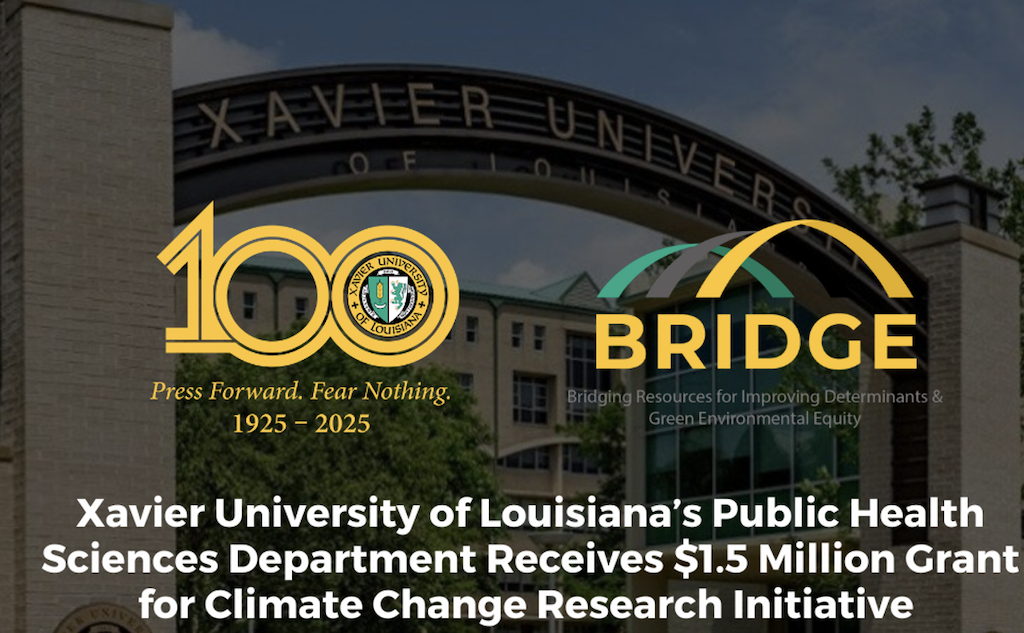Courtesy of Xavier University of Louisiana
Xavier University of Louisiana, blessed with a mission to promote a more just and humane society, has long been at the forefront of research and health equity to propel positive impact and engagement for the communities it serves. Invaluable in heading research efforts during the COVID-19 pandemic, the great work of the Public Health Sciences Department at Xavier has been recognized with a grant to further its research and community engagement activities concerning climate change. Their initiative, “Bridging the Gap Between Climate Change and Determinants of Health in South Louisiana,” has received a $1.5 million grant from the National Academies of Science.
Since its introduction to the university in 2012, the Public Health Sciences program at Xavier has been educating the next generation of leaders poised to tackle pressing health issues. Recognized by the United States Department of Education for its stand-out program, the department prepares students for impactful careers in public health. It encourages collaboration between students and professors on innovative research projects to eliminate health disparities and advance health equity. The funding from the grant will allow the program to research the detrimental effects climate change will have on public health, especially in the marginalized and underserved communities of Louisiana.
“In Southeast Louisiana, climate change poses threats to public health and well-being from heat stress, flooding, disasters, water quality, air quality, and the spread of infectious disease,” said Dr. Faye Grimsley, the project director and associate professor in Xavier’s Department of Public Health Sciences. “These threats are especially serious for communities of color and low-income communities. Addressing these threats by incorporating environmental exposures and climate change conditions in public health data systems will help create informed healthcare practices and equitable strategies for populations who face day-to-day climate change and environmental justice issues.”
Xavier’s project will focus on developing a database containing local and statewide data on the social detriments of health. This database will help to inform the development of strategies that tackle environmental change. Xavier is partnering with the Lower 9th Ward Center for Sustainable Engagement and Development and the Zion Travelers Cooperative Center to collect this data and engage with the community through tours, sustainability efforts, and volunteer opportunities. Learn more about Xavier’s project here.
Xavier is amongst the historically Black colleges and universities (HBCUS) selected for the $1.5 million grant over a 20-month period. Each university was chosen for its efforts to advance health equity in communities that disproportionately experience the effects of climate change.
“It is vital that HBCUs create solution-oriented work in communities historically impacted by environmental racism and climate change. This community-based project will yield great outcomes for the New Orleans, Gulf South region, and beyond,” said Dr. Billie Castle, the project co-director, and assistant professor in Xavier’s Department of Public Health Sciences.
The grant is awarded through the National Academies of Sciences (NAS), a nonprofit organization of world-leading researchers. The NAS’ Gulf Research Program (GRP), an initiative to protect and support a safer and more resilient Gulf region for those who live there, is partnering with the Robert Wood Johnson Foundation to sponsor the grant.
“There is no greater importance in understanding the impact of health equity for underserved and underrepresented communities than to provide opportunities for them to engage, enhance and experience the knowledge, discussion and calculations needed to address these health disparities and health determinants that are making our at-risk populations unhealthy,” said Arthur J. Johnson, the CEO of the Lower 9th Ward Center for Sustainable Engagement and Development. “This climate change project brings together academic strategies, community awareness and research demographics working in a concerted effort for the benefit of moving towards a more impactful solution for health challenges that cripple our coastal communities and the people that live there!”
The grant aims to support projects that have academic and community partnerships using community-based participatory research. Research by and from the community can better shape that community’s health policies and plans, eventually leading to better health outcomes for all.

